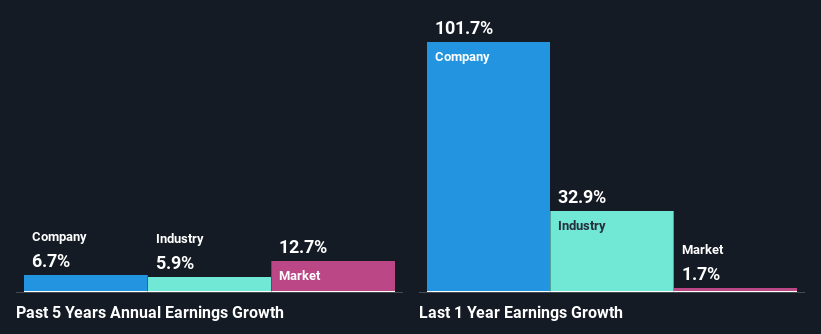- United States
- /
- Media
- /
- NasdaqGM:TTD
Is The Trade Desk, Inc.'s (NASDAQ:TTD) Latest Stock Performance A Reflection Of Its Financial Health?
Most readers would already be aware that Trade Desk's (NASDAQ:TTD) stock increased significantly by 25% over the past three months. Given the company's impressive performance, we decided to study its financial indicators more closely as a company's financial health over the long-term usually dictates market outcomes. Specifically, we decided to study Trade Desk's ROE in this article.
Return on Equity or ROE is a test of how effectively a company is growing its value and managing investors’ money. In other words, it is a profitability ratio which measures the rate of return on the capital provided by the company's shareholders.
View our latest analysis for Trade Desk
How Do You Calculate Return On Equity?
The formula for return on equity is:
Return on Equity = Net Profit (from continuing operations) ÷ Shareholders' Equity
So, based on the above formula, the ROE for Trade Desk is:
12% = US$308m ÷ US$2.6b (Based on the trailing twelve months to September 2024).
The 'return' refers to a company's earnings over the last year. That means that for every $1 worth of shareholders' equity, the company generated $0.12 in profit.
What Has ROE Got To Do With Earnings Growth?
So far, we've learned that ROE is a measure of a company's profitability. Based on how much of its profits the company chooses to reinvest or "retain", we are then able to evaluate a company's future ability to generate profits. Generally speaking, other things being equal, firms with a high return on equity and profit retention, have a higher growth rate than firms that don’t share these attributes.
Trade Desk's Earnings Growth And 12% ROE
To begin with, Trade Desk seems to have a respectable ROE. Further, the company's ROE is similar to the industry average of 11%. This probably goes some way in explaining Trade Desk's moderate 6.7% growth over the past five years amongst other factors.
We then performed a comparison between Trade Desk's net income growth with the industry, which revealed that the company's growth is similar to the average industry growth of 5.9% in the same 5-year period.

Earnings growth is a huge factor in stock valuation. The investor should try to establish if the expected growth or decline in earnings, whichever the case may be, is priced in. Doing so will help them establish if the stock's future looks promising or ominous. If you're wondering about Trade Desk's's valuation, check out this gauge of its price-to-earnings ratio, as compared to its industry.
Is Trade Desk Making Efficient Use Of Its Profits?
Given that Trade Desk doesn't pay any regular dividends to its shareholders, we infer that the company has been reinvesting all of its profits to grow its business.
Conclusion
Overall, we are quite pleased with Trade Desk's performance. Specifically, we like that the company is reinvesting a huge chunk of its profits at a high rate of return. This of course has caused the company to see substantial growth in its earnings. That being so, the latest analyst forecasts show that the company will continue to see an expansion in its earnings. Are these analysts expectations based on the broad expectations for the industry, or on the company's fundamentals? Click here to be taken to our analyst's forecasts page for the company.
Valuation is complex, but we're here to simplify it.
Discover if Trade Desk might be undervalued or overvalued with our detailed analysis, featuring fair value estimates, potential risks, dividends, insider trades, and its financial condition.
Access Free AnalysisHave feedback on this article? Concerned about the content? Get in touch with us directly. Alternatively, email editorial-team (at) simplywallst.com.
This article by Simply Wall St is general in nature. We provide commentary based on historical data and analyst forecasts only using an unbiased methodology and our articles are not intended to be financial advice. It does not constitute a recommendation to buy or sell any stock, and does not take account of your objectives, or your financial situation. We aim to bring you long-term focused analysis driven by fundamental data. Note that our analysis may not factor in the latest price-sensitive company announcements or qualitative material. Simply Wall St has no position in any stocks mentioned.
About NasdaqGM:TTD
Trade Desk
Operates as a technology company in the United States and internationally.
Flawless balance sheet with high growth potential.
Similar Companies
Market Insights
Community Narratives



